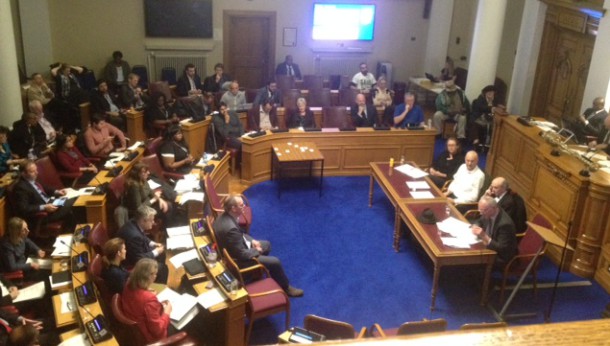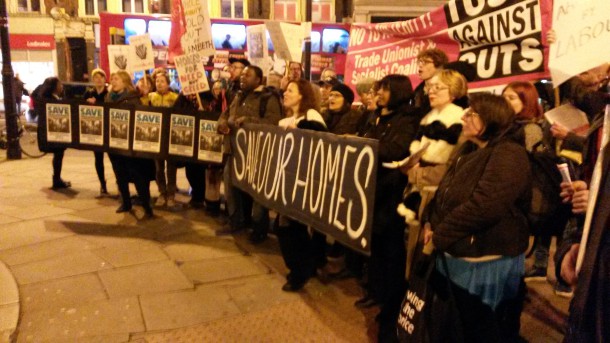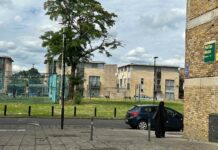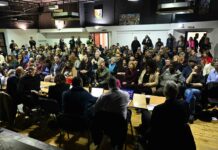
Last Wednesday (November 19) saw Lambeth’s councillors come together at the Town Hall, Brixton for one of four or five full council meetings per year. Although technically a place for decisions to be made, under the leader and cabinet system we have in the borough, important decisions are in reality taken behind closed doors by cabinet members before being ratified at cabinet meetings. With only four of the 63 council seats not held by the Labour party, full council meetings have increasingly become ceremonial proceedings. We asked Nick Christian to head down and write us a full report:
The official schedule listed an hour devoted to a debate on health services but housing once again dominated the agenda at Lambeth’s first full council meeting since July.
Before the meeting convened at 6.30pm, local housing groups and their supporters staged a protest on the steps of the town hall. Inside the chamber the Save Cressingham campaign deputation – which received the longest applause of the evening – was followed by a short demonstration, as an individual in the public gallery loudly voiced her objections that Loughborough Estate residents own deputation request had been denied. During Council Questions, a heated exchange between the Green Party’s Scott Ainslie and Cabinet Member for Housing Matthew Bennett (Labour, Gipsy Hill) culminated in the St Leonard’s councillor briefly exiting the chamber.
Mayor Adedamola Aminu called the meeting to order shortly after the official start time, with the council hearing apologies for absence from councillors Meldrum (Labour, Knight’s Hill), Jaffer (Labour, St Leonard’s) and Agdomar (Labour, Herne Hill) before approving the minutes from the last time the council met on July 23rd.

The evening’s themed debate, entitled “What Should Lambeth’s Health Services Look Like in 2024?”, featured a panel of health professionals: Dr Adrian McLachlan, Chair of Lambeth CCG, Catherine Pearson, Chief Executive of Healthwatch Lambeth and Professor John Moxham of King’s College Hospital.
Professor Moxham pointed to a recent report by the commonwealth fund which ranked the UK’s health care system as number one in the world, caveating that despite this accolade “we have the worst health of the people”. He went on to describe the significant health inequalities found even between proximal parts of South London. Disease-free life expectancy, he said, “is seventy years in Dulwich Village – those buggers will live forever – but on Walworth Road it’s 52.
In summing up the points raised in the debate Councillor Jim Dickson found the elected members and panelists to be largely in agreement. The main challenges facing the borough over the next ten years, he said, would stem from the huge burden placed on Lambeth by the wider economic situation, the borough’s ageing population, and the rise of lifestyle-linked diseases such as diabetes. The strategic focus would therefore need to be on preventative and primary care, integrating networks and improving partnerships between health services.
Following councillors’ presentation of constituents petitions on, issues including public urination, noise pollution and road closure, the meeting moved on to deputations.
The first, presented by Sophy Taylor, requested Lambeth Council’s support for a tube station in Camberwell, with the consultation process for the Bakerloo Line extension due to end on December 7th. Councillor Jack Hopkins, responding, said that he had written to TFL to lobby for the Camberwell option and described the council as “100% behind you”.
The second deputation came from Christina Bennett on behalf of residents of Cressingham Gardens Estate, the future of which has been in doubt since the council entered it into consultation in 2012. Five options are under consideration, including demolition of the estate.
The Save Cressingham campaign claims that ‘Option 1′, full refurbishment, would be at least £4m cheaper, while ensuring residents remain in their homes,
Ms Bennett spoke of a recent survey which found support for repairs from 80% of Cressingham’s residents. She went on to quote Lib Peck, leader of Lambeth Council, who in 2012 had said that the council was “not interested in doing anything to the estate that doesn’t command the confidence and support of its residents.”
In her closing statement Ms Bennett asked council members “to intervene in this fiasco and prevent the needless and costly damage to our lives and the public purse”. The deputation was accompanied by a petition of three thousand signatures.
Councillor Matthew Bennett, in response, spoke of the pressure placed on budgets by the housing crisis and said it was “important to remember why we’re having this conversation”. He added that the final decision as to the estate’s future is still to be made, maintaining that “all five options remain on the table”.
Before the meeting could move on to the next session it was interrupted for several minutes by an individual calling out from the public gallery. The unidentified woman was heard to be angry at the council’s denial of a deputation from residents of the Guinness Trust run Loughborough Park Estate. The estate is in a not dissimilar situation to Cressingham Gardens, with residents concerned about evictions of shorthold tenants and the implications of “regeneration”.
Although the Mayor was able to restore order for Council Questions, Lambeth’s equivalent of Prime Minister’s Questions, tensions in the chamber remained high.
When it was his turn, Green Party Councillor Scott Ainslie spoke of the Cressingham Gardens consultation process and asked of Councillor Bennett: “when are you going to get the message that residents favour Option 1?” Mr Bennett responded by congratulating Mr Ainslie on finding his way back from Oxford – a sarcastic reference to the fact that Mr Ainslie, an actor, appeared in a play there last summer. As Mr Ainslie stood to interject Mr Bennett cut him off, adding “one person speaks on stage, even if you’re just an understudy.” It was at this point Mr Ainslie, who was wearing a “Save Cressingham” t-shirt, left the room, returning a few minutes later. Mr Bennett did not answer the question.
The session continued with additional questions related to housing, as well as others on Streatham rail services, the council’s winter weather response plan and the sale of the town hall.
The final business of the evening saw the council pass a motion in support of lowering the voting age to 16. An opposition amendment, calling for similar support for proportional representation in local and national elections, was comfortably defeated by the ruling Labour party. Labour’s fifty nine Lambeth councillors (94% of the total) were elected with 54% of the borough-wide vote.




What is it with Lambeth Labour councillors? They have a record of unnecessary and childish taunts (ones that carry over on to Twitter) and they show an incredible amount of insecurity towards the opposition – especially given their majority. I don’t mind a bit of political knockabout, but I wonder is the current administration mature enough to be in power? Based on episodes like this – the answer is no.
Agree. The fact that Cllr Bennett chose not to answer the question put to him properly by an opposition Cllr but instead of resorted to sarcastic and unnecessary remarks gives an air of impression of a couldn’t care less attitude. The question was over the homes, community and livelihoods of Lambeth residents. Fair enough, not in his ward, but not to be dismissed in this joking manner even if that joke were directed at the questioner himself. Cannot say anything useful or constructive, don’t open mouth and engage larynx.
Your headline to this report refers to a Lambeth Council discussion on mental health, but this isn’t mentioned in the article. Did the discussion take place, or did you decide that covering the housing debate was more important?
Hi Charlie. Although mental health was touched upon, the debate was more general and covered all of Lambeth’s health services. The headline has been updated.